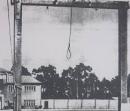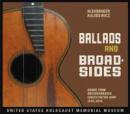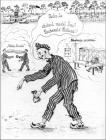Moja, moja, moja brama -
Zamykana, zamykana haargenau;
Moja, moja, moja brama -
Zakichana, zakichana, alte Sau!
Moja, moja śliczna moja bramusia,
Wszystkich połknie i nikogo nie puszcza!
Moja, moja drania-brama...
Będziesz, łajzo, wylamana – na sto dwa!
Zamykana, zamykana haargenau;
Moja, moja, moja brama -
Zakichana, zakichana, alte Sau!
Moja, moja śliczna moja bramusia,
Wszystkich połknie i nikogo nie puszcza!
Moja, moja drania-brama...
Będziesz, łajzo, wylamana – na sto dwa!
Contributed by Riccardo Venturi - 2020/8/23 - 09:27
Language: Italian
Traduzione italiana / Italian translation / Traduction italienne / Italiankielinen käännös:
Riccardo Venturi, 23-8-2020 09:32
Riccardo Venturi, 23-8-2020 09:32
Il mio, il mio, il mio cancello -
Chiuso, chiuso stretto e sprangato perbene! [1]
Il mio, il mio, il mio cancello -
Marcio, marcio fin nelle barbe, vecchia troia!
Il mio, il mio, il mio cancelluccio,
Che inghiotti tutti quanti e non fai uscire nessuno!
Il mio, il mio, il mio schifoso cancello,
Sarai fatto a pezzi, brutto stronzo di merda!
Chiuso, chiuso stretto e sprangato perbene! [1]
Il mio, il mio, il mio cancello -
Marcio, marcio fin nelle barbe, vecchia troia!
Il mio, il mio, il mio cancelluccio,
Che inghiotti tutti quanti e non fai uscire nessuno!
Il mio, il mio, il mio schifoso cancello,
Sarai fatto a pezzi, brutto stronzo di merda!
[1] In tedesco nel testo: haargenau, lett. "preciso come un capello"
Language: English
My gate
My, oh, my, my gate -
Locked, locked, tightly and precisely locked!
My, oh, my, my gate -
Rotten, rotten, old and filthy, lousy pig!
My, oh, my pretty little gate,
You swallow everyone up, you don't let anyone out!
My, oh, my nasty gate,
You'll be busted to pieces, I guarantee it, filthy scum!
My, oh, my, my gate -
Locked, locked, tightly and precisely locked!
My, oh, my, my gate -
Rotten, rotten, old and filthy, lousy pig!
My, oh, my pretty little gate,
You swallow everyone up, you don't let anyone out!
My, oh, my nasty gate,
You'll be busted to pieces, I guarantee it, filthy scum!
Contributed by Riccardo Venturi - 2020/8/23 - 09:34
×
![]()
Note for non-Italian users: Sorry, though the interface of this website is translated into English, most commentaries and biographies are in Italian and/or in other languages like French, German, Spanish, Russian etc.








Lyrics / Testo: Aleksander Kulisiewicz
Music / Musica: Zsigmond Lajos Kertész [1876-1953] (“Szép a rózsám”, 1933)
One form of torture routinely meted out at Sachsenhausen went under the innocent name of “Sport”. “My gate” recalls a typically malicious competition devised by the SS, the “Indian Dance”. As guards barked out the moves, prisoners were forced rapidly to raise their arms, look to the sky, whirl around, drop to the ground and stand again. This sequence would be repeated over and over. Kulisiewicz reports that inmates “vomited after such 'dancing', that the entire Apellplatz [assembly area] swayed before one's eyes, and with it the damned gate of the SS command”. Kulisiewicz first heard this popular central European tune sung to the Serbo-Croatian lyric, “Moja mala nema mane”.
Una forma di tortura comminata normalmente a Sachsenhausen andava sotto l'innocente nome di “sport”. “Il mio cancello” rievoca una sorta di tipica e malvagia “gara” inventata dalle SS, la “Danza indiana”. Mentre le guardie urlavano seccamente i movimenti da fare, i prigionieri erano obbligati a alzare rapidamente le braccia, guardare in alto, girare su se stessi, lasciarsi andare a terra e ritirarsi su. La sequenza doveva essere ripetuta all'infinito. Kulisiewicz racconta che i prigionieri “vomitavano dopo questa 'danza' “, e che “tutto il cortile dell'appello [Apellplatz] girava negli occhi, e insieme a lui il maledetto cancello del comando SS”. Kulisiewicz aveva sentito per la prima volta questa popolare melodia centroeuropea cantata su “Moja mala nema mane”, un motivo serbocroato.
"This compact disc focuses exclusively on Kulisiewicz’s own song repertoire from Sachsenhausen. These recordings, preserved on reel-to-reel tapes by Kulisiewicz after the war, are of variable quality, reflecting the conditions in which they were produced, from home recordings to studio or concert hall productions. The selections are arranged chronologically and are intended to provide both a representative sample of Kulisiewicz’s artistic output and a sense of his personal reactions to the realities of life in a Nazi concentration camp"
1. Muzulman-Kippensammler
2. Mister C
3. Krakowiaczek 1940
4. Repeta!
5. Piosenka niezapomniana
6. Erika
7. Germania!
8. Olza
9. Czarny Böhm
10. Maminsynek w koncentraku
11. Heil, Sachsenhausen!
12. Pożegnanie Adolfa ze światem
13. Tango truponoszów
14. Sen o pokoju
15. Dicke Luft!
16. Zimno, panie!
17. Moja brama
18. Pieśń o Wandzie z Ravensbrücku
19. Czterdziestu czterech
20. Wielka wygrana!
Aleksander Kulisiewicz (1918–1982) was a law student in German-occupied Poland in October 1939 when the Gestapo arrested him for antifascist writings and sent him to the Sachsenhausen concentration camp near Berlin. A talented singer and songwriter, Kulisiewicz composed 54 songs during five years of imprisonment. After liberation, he remembered his songs as well as ones he had learned from fellow prisoners and dictated hundreds of pages of them to his nurse in a Polish infirmary. As a “camp troubadour,” Kulisiewicz favored broadsides—songs of attack whose aggressive language and macabre imagery mirrored his grotesque circumstances. But his repertoire also included ballads that often evoked his native Poland with nostalgia and patriotic zeal. His songs, performed at secret gatherings, helped inmates cope with their hunger and despair, raised morale, and sustained hope of survival. Beyond this spiritual and psychological importance, Kulisiewicz also considered the camp song to be a form of documentation. “In the camp,” he wrote, “I tried under all circumstances to create verses that would serve as direct poetical reportage. I used my memory as a living archive. Friends came to me and dictated their songs.” Haunted by sounds and images of Sachsenhausen, Kulisiewicz began amassing a private collection of music, poetry, and artwork created by camp prisoners. In the 1960s, he joined with Polish ethnographers Józef Ligęza and Jan Tacina in a project to collect written and recorded interviews with former prisoners on the subject of music in the camps. He also inaugurated a series of public recitals, radio broadcasts, and recordings featuring his repertoire of prisoners’ songs, now greatly expanded to encompass material from at least a dozen Nazi camps. Kulisiewicz’s monumental study of the cultural life of the camps and the vital role music played as a means of survival for many prisoners remained unpublished at the time of his death. The archive he created, the largest collection in existence of music composed in the camps, is now a part of the Archives of the United States Holocaust Memorial Museum in Washington, D.C.
Aleksander Kulisiewicz (1918-1982) era uno studente di giurisprudenza nella Polonia sotto occupazione tedesca quando, nell'ottobre 1939, la Gestapo lo arrestò per i suoi scritti antifascisti e lo inviò al campo di concentramento di Sachsenhausen, vicino a Berlino. Kulisiewicz era un cantautore di talento: durante i suoi cinque anni di prigionia compose 54 canzoni. Dopo la liberazione si ricordò non solo delle sue canzoni, ma anche di quelle che aveva imparato dai suoi compagni di prigionia, e dettò centinaia di pagine alla sua infermiera in un ospedale polacco. In quanto “cantastorie del campo”, Kulisiewicz prediligeva le ballate descrittive, usando un linguaggio aggressivo e brutale per riprodurre le circostanze grottesche in cui si trovava assieme agli altri; ma il suo repertorio comprendeva anche ballate che, spesso, evocavano la Polonia natia con nostalgia e patriottismo. Le sue canzoni, eseguite durante riunioni segrete, aiutarono i prigionieri a far fronte alla fame e alla disperazione, sostenendo il morale e le speranze di sopravvivenza. Oltre a rivestire un'importanza spirituale e psicologica, Kulisiewicz riteneva che le canzoni del campo fossero anche una forma di documentazione. “Nel campo”, scrisse, “ho cercato sempre di creare versi che servissero da reportage poetico diretto. Ho usato la mia memoria come un archivio vivente. Gli amici venivano da me e mi recitavano le loro canzoni.” Quasi ossessionato dai suoni e dalle immagini di Sachsenhausen, Kulisiewicz cominciò a raccogliere una collezione privata di musica, poesia e opere d'arte create dai prigionieri. Negli anni '60 si unì agli etnografi polacchi Józef Ligęza a Jan Tacina in un progetto di raccolta di interviste scritte e registrate con ex prigionieri a proposito della musica nei campi di concentramento. Cominciò anche a tenere una serie di spettacoli, trasmissioni radiofoniche e incisioni del suo repertorio di canzoni di prigionia, che si ampliarono fino a comprendere materiale proveniente da almeno una dozzina di campi. L'enorme studio di Kulisiewicz sulla vita culturale nei campi e sul ruolo decisivo che la musica vi svolgeva come strumento di sopravvivenza per molti prigionieri rimase inedito fino alla sua morte. L'archivio da lui creato, la più vasta raccolta esistente di musica composta nei campi di concentramento, fa ora parte degli archivi dell'United States Holocaust Memorial Museum a Washington.